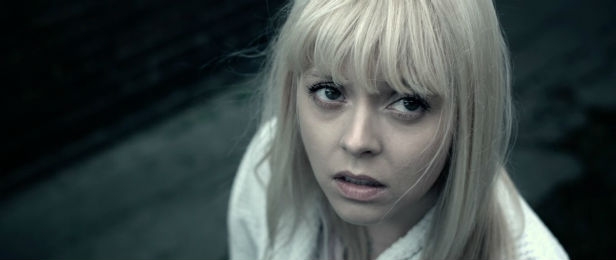Time is a slippery concept in hugely ambitious British sci-fi The Scopia Effect, which hurls its heroine and the viewer into a seemingly unconnected series of eras and places with mind-bending results.
Polish Londoner Basia (Joanna Ignaczewska) has a very typical life in many ways. She lives alone, she has an office job, she has a regular exercise class. She is also visiting a hypnotherapist to help her to deal with her depression. However, these journeys into her past and her grief over the loss of her mother open a door into other time streams. From 1537 England in 1537 to Japan in 1824, via France in 1712, Germany in 1916 and India in 1641, ghosts and fragments begin to force their way into Basia’s consciousness and threaten to tear it apart.
As previously stated, writer-director Christopher Butler’s debut is very ambitious indeed. Accessibility isn’t the first word that jumps to mind, as the filmmaker trusts the viewer to make the connections between these various times and places and the hell it’s pushing Basia through. Giving us just enough without making it easy is a tough tightrope to walk, but for the most part Butler’s confidence and skill makes it an engaging and challenging puzzle.
Stanley Kubrick’s 2001 is clearly an influence, but what’s almost more engaging are the film’s roots in British folk fantasy and horror. At its best, The Scopia Effect conjures stories like Alan Garner’s Red Shift and Alan Moore’s Voice Of The Fire. The pain of past lives becomes mirrored; a connecting thread through these disparate stories. Butler also gives us some quite shocking moments, including a sequence involving a wall that will stick with you.
Ignaczewska provides a strong emotional centre as Basia. She conveys the fragility of the character but there’s a determination to claw her way back to a normal life that keeps us invested in her journey beyond the trauma and the screaming. The performances are strong throughout the different eras and countries, and the cinematography by from Jaime Feliu-Torres and Charlie Herranz is superb.
The film’s final third does start to unravel as Butler gets every strand to a satisfying end point before giving us a rushed explanation about what exactly has been going on. Still, this is an unusual and affecting sci-fi that challenges itself and its audience, and it’s certainly a striking debut. Give it a look.
The Scopia Effect is available on iTunes now. Keep up with the latest genre news with the new issue of SciFiNow.
